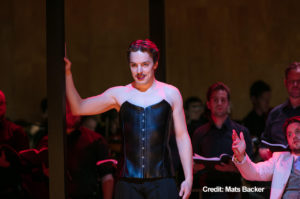
Philharmonie De Paris 2018-19 Review: The Rake’s Progress
Showcasing Bright Young Imperfection
By Polina Lyapustina“I strive to bring out the best in myself, but I also know that perfection does not exist. And to be honest: I don’t care. Neither in myself nor in others. In my eyes, perfectionism is an unhealthy and cramped urge. Because you cannot force perfection. Compare it to lying in the water. Whoever relaxes, who dares to surrender, stays afloat. He who fights drowns.”
I read this quote on Barbara Hannigan’s official Facebook page, two days after “The Rake’s Progress” in Paris. I was by a large desk at a coffee shop just back in Vilnius, and laughed bitterly.
“What a terrible excuse,” I thought.
Time for Stress
We all live in times of uncertainty and stress, and the opera industry is not the right place for those who seek a quiet harbor. Competition is huge, and talent is definitely not enough. The worst part is that actually, no one knows what is enough. And some singers actually spend their lives trying to find that answer, but forget a more important question in the process: Enough for what?
I can only speak for myself, but I see the goal as a consistent and natural development of the voice with a certain understanding of how to use it at any given moment. And the only path is constant work. And this work is hard, but I never heard of any talent was paid off without efforts.
Barbara Hannigan founded Equilibrium to mentor young professionals, using her own experience, “to cultivate awareness and skill towards optimum enjoyment and generosity in music collaboration,” and “to address preparation, stamina, focus, mistake recovery.” So, they concentrated on the comprehensive personal development of the singers. And this I find a great approach.
So, attending the performance of Equilibrium artists I was mostly about to check on what this approach could bring.
The Rake’s Progress
The Rake’s Progress is incredibly complex. It is hard to get, hard to understand, and hard to love at first sight. It will fox you. It will make you think you’ve got it only to make you realize you have no clue.
There’s nothing extremely complicated in the plot. A good but poor boy Tom deserts his lover for the delights of London in the company of the Devil. After several misadventures, all initiated by his companion, Tom ends up in a hospital for the “insane.”
But music is not that simple at all. In his culminating work in the neoclassical period, Stravinsky mastered his percussive punches at the highest level: you can almost not hear them, but you feel them in your heartbeat. His signature dissonances were now hidden behind melodic accompanying arias. And you can hear them as melodic, but in their cores, the main vocal lines are broken.
And that was a piece Barbara Hannigan offered to her singers to perform. I cannot say how the preparation went, but what I could see on stage were young singers that felt comfortable and relaxed like nothing special was happening. That was a pleasant feeling they spread to the audience. And they were playful, so they played.
It Was Fine, But…
We certainly won’t have to doubt the talent of the young singers. Sophie Asplund as Anne Trulove was fresh and bright. Gyula Rab as Tom Rakewell was a perfect choice for this role. Douglas Williams as Nick Shadow was both diabolic and humorously persuasive. Erik Rosenius was too big for just Father Trulove, so he succeeded to sing Mother Goose too. Marta Swiderska was simply impressive.
But that wasn’t enough.
Once we reached the Tom’s first manifest (he sang standing on a chair and enjoyed his performance), the problem was exposed. He couldn’t follow micro shifts in his vocal line. He sang freely, forgetting his aria was meant to draw the perspective of his whole life, not simply manifesting the written words. And this, more or less, happened with the rest of the singers.
The light and fair music of this opera requires more preparation and work than any of ramose passages of the Romantic period. It’s a musical micro-science. And no matter how good the voices were, the work for this performance wasn’t properly done.
I imagined them deciding to try to make it easy and enjoyable for both singers and audience. And I even think, they copped it in some ways. But this performance showed me the problem with the interpretation of the initial statement of reducing a stress level. Less stress doesn’t mean less work. The comfortable feeling should be reached not by lowering the bar. I will not stand for the better feeling behind the worse performance.
Under The Conductor’s Wing
Barbara Hannigan gave a complex and very flexible reading of Stravinsky’s many-layered score. Her performance was all made of small details. She effortlessly manages to conduct the orchestra and choir and to sing (along with the orchestra) of course. But I felt like her conducting was just another level, and at the same moment I thought, she wasn’t yet a perfect conductor. But she was comprehending. And her conducting goals were way higher than those she set for her singers.
And at that moment, I understood, that this brilliant idea of losing perfection works for Barbara Hannigan better than for the young singers from Equilibrium project. When one has reached mastery as a musician, it makes sense to reduce the pressure, but this will never change her understanding of the result. She may not pursue perfection now because she already can feel the right amount of beauty with her skin.
But will it work for young artists, who being talented and bright, also learn to collaborate and be relaxed more than to understand how to bring outstanding performances to their future audience? Will they survive in the opera industry, if they expect other people also to follow a well-balanced flow, which now runs aside from the major stages? Will this approach of “feeling well” before “singing well” work for them or become a start of their rake’s progress?
These are the essential questions.



